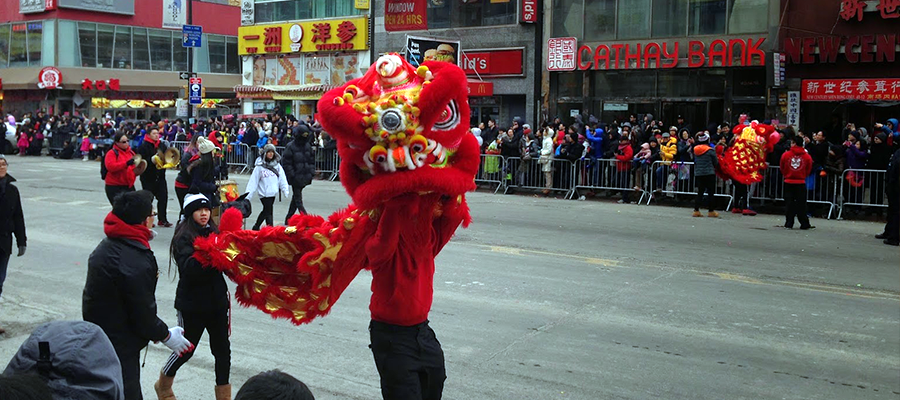Chinese Lunar New Year: An Increasingly Digital Celebration

When U.S. investors talk about technology stocks the FANG acronym often comes to mind: Facebook, Amazon, Netflix and Google. We believe BAT: Baidu, Alibaba, Tencent is an equally useful acronym for thinking about Chinese technology stocks. A typical American interacts with the FANG companies at least once a day, in China the BAT companies are equally as widely used.
In order to give investors a clearer picture of how the BAT companies and their peers have ingrained themselves into virtually every aspect of daily life in China, KraneShares guest contributor Nan Li (李楠) has prepared the following fictional account of how a typical person will celebrate the upcoming Lunar New Year in China.
The Lunar New Year holiday dates back over 4000 years with many unique traditions like gifts of cash-filled red envelopes, celebratory fireworks, lion dances, and family reunions with lots of food. While these traditions span centuries, Mr. Li’s story will give investors a clear picture of how technology has recently reshaped and enriched both the Lunar New Year celebration and daily life in China.
John & Victoria’s Year of the Monkey Celebration
John Li is a portfolio analyst at a mutual fund company located in Shanghai. He is 28 years old. He and his lovely girlfriend Victoria plan to marry in 2016; the Year of the Monkey. John and Victoria met two years ago through the online dating app, MOMO. They later moved into a one-bedroom apartment in Shanghai’s Pudong district that they found using the online real estate site Soufun.com.
The period leading up to Lunar New Year is typically an exciting time full of plans for the pending festivities. For John, however, this year is full of worry because he will be traveling to visit Victoria's family for the first time. This is particularly stressful for John because in China meeting a girlfriend’s family means not only meeting her parents, but also her grandparents, aunts, uncles, nieces, and nephews from both sides of the family.
Lunar New Year kicks off China’s weeklong Spring Festival celebration. This year the festival will last from February 7 through 13. Looking at the calendar, John is wrapped in anxiety. Winning Victoria's family acceptance all depends on this trip. He needs a very detailed and well-prepared plan to ensure a smooth trip.
12:00 am Jan 17th 2016, 20 days before Spring Festival – China Railway Company starts the online sale of festival week train tickets. John and Victoria both work in Shanghai, so he needs to book two tickets to Beijing, Victoria’s hometown. Given last year’s shocking record of 2.81 billion rail passengers during the 40-day New Year travel period, John has to act fast to buy the tickets. This year will be another amazing, yet busy, national event. The government has predicted an increase of 3.6%, or 100 million passengers, on last year's figures1. John connects to the fast internet through his powerful PC, which he had delivered to his apartment via bike messenger from JD.com earlier that year. John refreshes the page, and the tickets are ready to go.
09:00 pm Feb 6th 2016, 1 day before spring festival – John is discussing arrangements with Victoria for their visit to Beijing. Even though Victoria’s family invited them to stay in their house for the week, John is hesitant to take such a big step on his first visit. The couple decides it might be best to book a hotel room for their five-day trip to give themselves a little space. In addition to visiting Victoria's family, they will also spend their much-needed holiday doing a little sightseeing. John loads up the online travel site Ctrip.com. On the site he books the hotel and also researches several great places to visit near Beijing, like the Great Wall and the Forbidden City. With one click he books the hotel and makes the sightseeing arrangements.
05:30 am Feb 7th 2016, 12.5 hours before family dinner – John and Victoria leave their apartment. John opens his Baidu Maps app (similar to Google Maps) and hails an Uber to take them to the Shanghai Hongqiao Railway Station. In 2015, Baidu led a funding round in China that raised an estimated $1.2 billion USD to invest in Uber China, a separate company Uber set up to operate in China2. Previously in 2014, Baidu invested an estimated $600 million in Uber China3, Uber China is currently valued at $7 billion2.
As John and Victoria reach the station, John receives a message informing him the packages he ordered have already been delivered to the front desk of the hotel. The package contains the gifts John bought for Victoria’s family from Taobao.com, one of the largest online marketplaces run by Alibaba. He bought green tea for the grandparents, imported mangos for the aunts and uncles and Legos for Victoria’s little nieces and nephews. He believes that these well-chosen gifts will impress his girlfriend’s family. The Uber arrives at the station, the trip is automatically debited from John’s AliPay account.
07:00 am Feb 7th 2016, 11 hours before family dinner - John and Victoria take their seats on the train. The trip will cover 870 miles and last 6 hours traveling at 140 miles per hour. In order to pass the time, John takes out his mobile phone and swipes through the latest news stories on Netease.com, while listening to music on the Youku app. Victoria downloaded her favorite TV show, The Big Bang Theory, from SOHU.COM the previous night. She watches the show on her phone to pass the time during the trip.
01:00 pm Feb 7th 2016, 5 hours before family dinner - John and Victoria arrive in Beijing and check Baidu Maps to figure out the best way to get to the hotel and then to Victoria’s house. After they pick up the gifts, it’s time to head to Victoria’s family home.
06:00 pm Feb 7th 2016, Spring Festival family dinner time - The initial meeting with Victoria’s family goes even better than John could have imagined. Everyone loves their gifts, and John gets along with Victoria’s family very well. For the grand finale, John cooks the family his specialty dish, sweet and sour fish.
08:00 pm Feb 7th 2016 – John sends his greetings and many virtual red envelopes to different WeChat groups of his friends and colleagues. WeChat is the most popular chatting app in China run by Tencent. Sending red envelopes is a traditional method of expressing one’s appreciation to their family and friends. When Tencent added virtual red envelope functionality to WeChat last year it was a huge success. Over 3.27 billion red envelopes were sent in 2015 representing an estimated total dollar amount of $40 – $50 Billion4. Tencent added between 100-200 million new users (and their bank accounts) to its WeChat Pocket mobile payment service during Spring Festival last year5.
12:00 am Feb 8th 2016 – It is time for fireworks. John and Victoria bring all the fireworks downstairs and welcome the Chinese New Year. John takes many beautiful and happy photos with Victoria and her family. He uploads the best pictures to his Sina.com blog. The night ends with happy smiles and John feels that he just may have won the acceptance from Victoria’s family. The Year of the Monkey is off to a great start for John and Victoria
.Conclusion
While this story was fictional, the types of interactions the characters had with the technology companies listed above are extremely commonplace throughout China. Many U.S. investors are aware of the ever-expanding universe of apps and web services offered in the United States – we believe they should be equally aware of similar technology companies in China.
Overview of Chinese Tech Companies Mentioned Above
| Company Name | Description | % of KWEB net assets as of 02/01/2016 |
| TENCENT HOLDINGS LTD | Tencent Holdings Limited is a Chinese investment holding company whose subsidiaries provide media, entertainment, internet and mobile phone value-added services, and operate online advertising services in China. | 11.4% |
| ALIBABA GROUP HOLDING-SP | Alibaba Group Holding Limited is a Chinese e-commerce company that provides consumer-to-consumer, business-to-consumer and business-to-business sales services via web portals. | 8.33% |
| BAIDU INC - SPON ADR | Baidu, Inc., incorporated on January 18, 2000, is a Chinese web services company headquartered at the Baidu Campus in Beijing's Haidian District. | 7.53% |
| CTRIP.COM INTERNATIONAL-A | Ctrip is a mainland China-focused travel agency, which runs the eponymous Ctrip.com travel website. | 6.66% |
| JD.COM INC-ADR | JD.com or Jingdong Mall, formerly 360buy, is a Chinese electronic commerce company headquartered in Beijing. It is one of the largest B2C online retailers in China by transaction volume. | 5.74% |
| YOUKU.COM INC ADR | Youku Tudou is the result of the 2012 merger of Chinese internet sites Youku and Tudou, creating one of China's biggest video sites. The chairman of the board is Victor Koo, the founder of Youku. The company has a stock listed on the NYSE, YOKU. | 4.79% |
| NETEASE.COM INC ADR | NetEase, Inc. is a leading China-based Internet technology company founded in 1997 that pioneered the development of applications, services and other technologies for the Internet in China. | 4.31% |
| SOHU.COM INC | Sohu, Inc. is a Chinese Internet company headquartered in the Sohu Internet Plaza in Haidian District, Beijing. This company and its subsidiaries offer advertising, a search engine, on-line multiplayer gaming and other services. | 2.50% |
| SOUFUN HOLDINGS LTD. ADR | SouFun Holdings Limited (NYSE:SFUN) runs the largest real estate web advertising portal in China. | 2.38% |
| MOMO INC-SPON ADR | Momo is a free location-based services instant messaging application for smartphones and tablets. | 2.38% |
Click here to download a full list of KWEB holdings as of 02/01/2016
BAT stocks have a higher 3 year average sales growth than FANG stocks and can serve to diversify an investors technology allocation.
FANG 3 Year Average Sales Growth
| Company | 3yr Average Sales Growth(%) | Auditor |
| 52.3% | Ernst & Young | |
| Amazon | 20.5% | Ernst & Young |
| Netflix | 23.4% | Ernst & Young |
| 14.4% | Ernst & Young | |
| Combined Average | 27.7% | |
BAT 3 Year Average Sales Growth
| Company | 3yr Average Sales Growth(%) | Auditor |
| Baidu | 50.2% | Ernst & Young |
| Alibaba | 56.5% | PWC |
| Tencent | 40.8% | PWC |
| Combined Average | 49.2% | |
Data from Bloomberg as of 12/31/2015
The KraneShares CSI China Internet ETF (ticker: KWEB) gives investors exposure to China technology companies, including not only the BAT stocks, but also all the companies mentioned in Mr. Li's story and more. Please contact us for more information on KWEB’s holdings.
From all of us at KraneShares we wish you a happy and prosperous Year of the Monkey.
- Wang Ao, "China will transport 2.91 billion passengers during Spring Festival 2016", People's Daily Online Exclusives, 01/25/2016
- Hannah Kuchler & James Kynge, "Uber raises $1.2bn for Chinese unit, in round that includes Baidu", The Financial Times, 09/07/2015
- "Baidu to Buy Uber Stake in Challenge to Alibaba in China", Bloomberg News, 12/17/2014
- "During Spring Festival 2015, 3.27 Billion Red Envelopes Were Sent", Beijing Daily Newspaper, 2/25/2015
- Z-BEN ADVISORS prediction as reported by the Financial Times, “Tencent beats Alibaba in ‘red envelope’ app war”, 2/27/2015

















